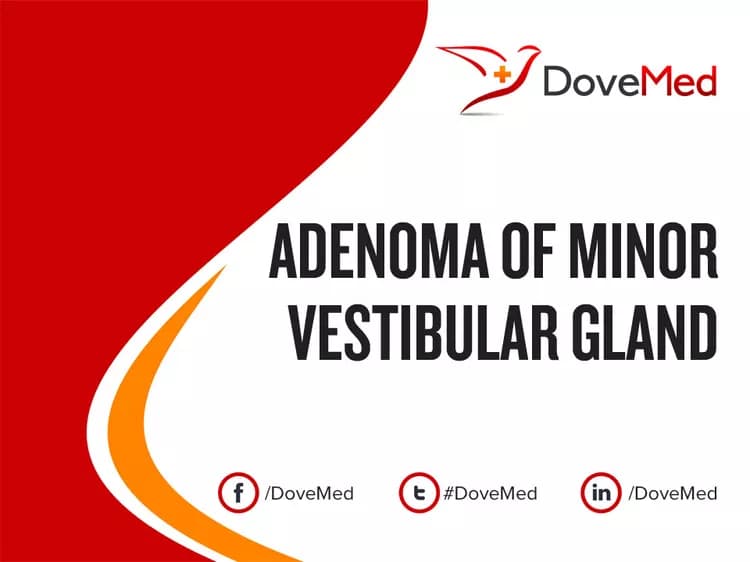What are the other Names for this Condition? (Also known as/Synonyms)
- Minor Vestibular Gland Adenoma
What is Adenoma of Minor Vestibular Gland? (Definition/Background Information)
- Adenoma of Minor Vestibular Gland is a tumor or adenoma on the minor vestibular gland. The growth, which may occur as a painless mass, is observed in the glandular cells
- The vestibular glands are located on the vulva. There are 2 types of vestibular glands. The major vestibular gland is also known as Bartholin gland. The function of the minor vestibular glands is to secrete lubricating fluids
- Adenoma of Minor Vestibular Gland typically affects women in their reproductive age. A major risk factor for this benign condition is being a young woman of childbearing age
- The cause of Adenoma of Minor Vestibular Gland is not clearly known. It is under investigation by research scientists
- The condition presents as a painless lump in the vaginal area. Women may feel discomfort while walking. Occasionally, the tumors are reported to bleed following ulceration
- Some complications that could develop from the condition include pain during intercourse, infection of the tumor, emotional stress, etc.
- Generally, if the condition does not bother a patient, treatment is not required. When a woman reports discomfort, such as pain during intercourse, the tumor may be removed by surgical excision
- Following treatment (if required), the prognosis of Minor Vestibular Gland Adenoma is generally reported to be very good
Who gets Adenoma of Minor Vestibular Gland? (Age and Sex Distribution)
- Adenoma of Minor Vestibular Gland generally affects women in their most fertile years
- There are no reports of the condition being exclusive to any particular population, race or ethnic group
What are the Risk Factors for Adenoma of Minor Vestibular Gland? (Predisposing Factors)
- Being young and of child-bearing age is considered the most significant risk factor for a woman developing Adenoma of Minor Vestibular Gland
It is important to note that having a risk factor does not mean that one will get the condition. A risk factor increases ones chances of getting a condition compared to an individual without the risk factors. Some risk factors are more important than others.
Also, not having a risk factor does not mean that an individual will not get the condition. It is always important to discuss the effect of risk factors with your healthcare provider.
What are the Causes of Adenoma of Minor Vestibular Gland? (Etiology)
- The exact cause of Adenoma of Minor Vestibular Gland formation is unknown; scientists are making an effort to understand the condition
- It must be noted that the condition is not communicable, either through casual physical or sexual contact
What are the Signs and Symptoms of Adenoma of Minor Vestibular Gland?
Some often reported symptoms of Adenoma of Minor Vestibular Gland are:
- The presence of a slow-growing, painless mass, ranging in size from 1-10 mm
- The growth occurs in the external vaginal opening
- Discomfort while walking or sitting
How is Adenoma of Minor Vestibular Gland Diagnosed?
The diagnosis of Adenoma of Minor Vestibular Gland may involve:
- An examination of the genital area and evaluation of medical history
- A skin biopsy may be performed to confirm the diagnosis made by the healthcare provider
Many clinical conditions may have similar signs and symptoms. Your healthcare provider may perform additional tests to rule out other clinical conditions to arrive at a definitive diagnosis.
What are the possible Complications of Adenoma of Minor Vestibular Gland?
Adenoma of Minor Vestibular Gland may lead to some potential complications such as:
- Pain or discomfort during intercourse
- Ulceration of the tumor, and consequential secondary bacterial or fungal infection
- Stress
How is Adenoma of Minor Vestibular Gland Treated?
- In a majority of cases of Adenoma of Minor Vestibular Gland, patients do not report symptoms and therefore, no treatment may be required, other than offering support
- If a patient does report physical discomfort, the condition is effectively treated with surgical excision of the tumor
How can Adenoma of Minor Vestibular Gland be Prevented?
At this time, no methods have been reported for the prevention of Adenoma of Minor Vestibular Gland
What is the Prognosis of Adenoma of Minor Vestibular Gland? (Outcomes/Resolutions)
By virtue of the Adenoma of Minor Vestibular Gland being benign, even when symptoms are present and surgery is warranted, the outcome is reported to be excellent.
Additional and Relevant Useful Information for Adenoma of Minor Vestibular Gland:
- There is no scientific, published evidence to show that oily foods and chocolate-based products have an influence on tumor formation
- Avoiding harsh chemicals for cleaning the skin may aggravate prevailing skin conditions
- Maintaining personal hygiene is always recommended for general health and preventing any skin condition from getting worse
Related Articles
Test Your Knowledge
Asked by users
Related Centers
Related Specialties
Related Physicians
Related Procedures
Related Resources
Join DoveHubs
and connect with fellow professionals


0 Comments
Please log in to post a comment.